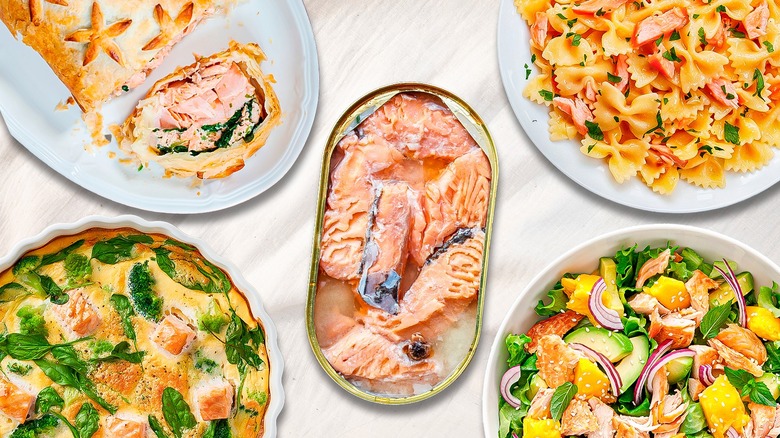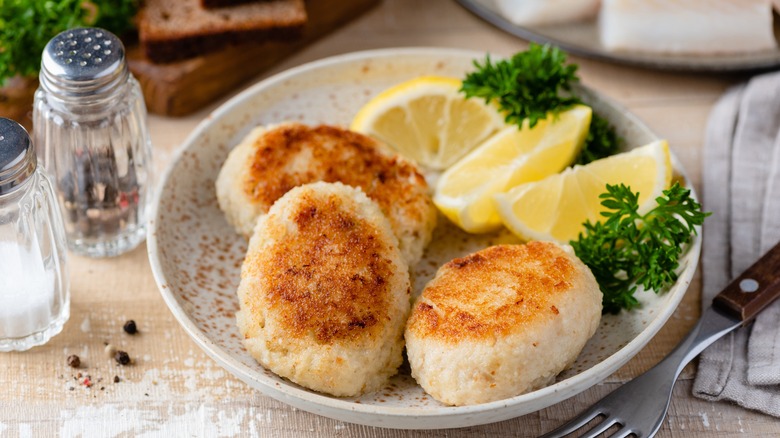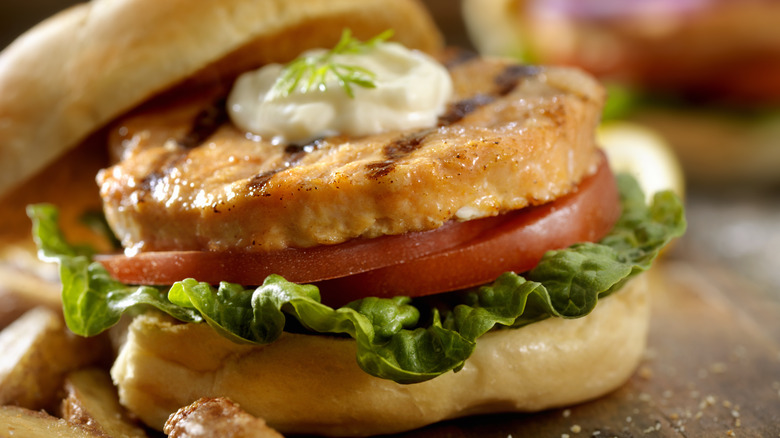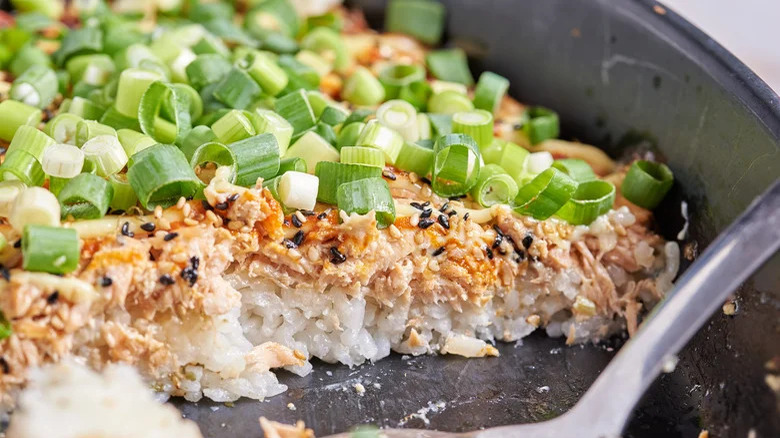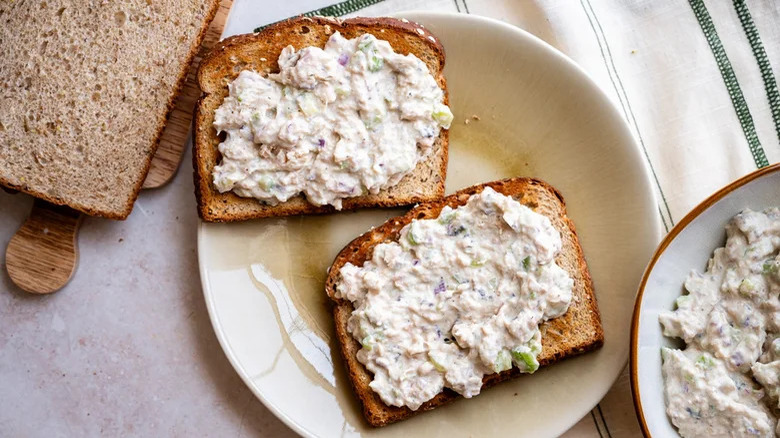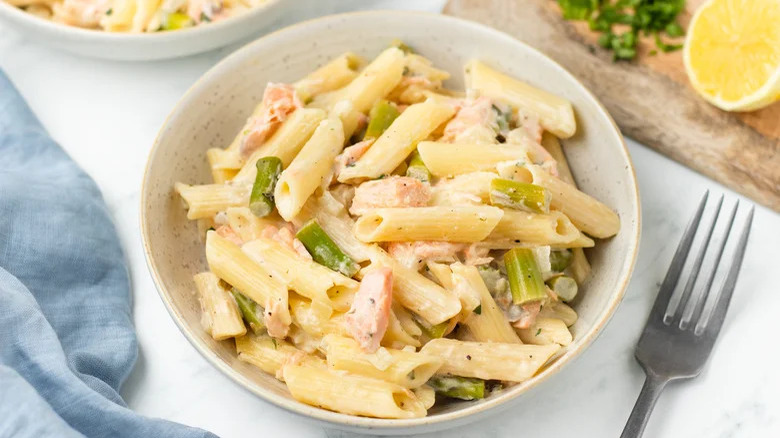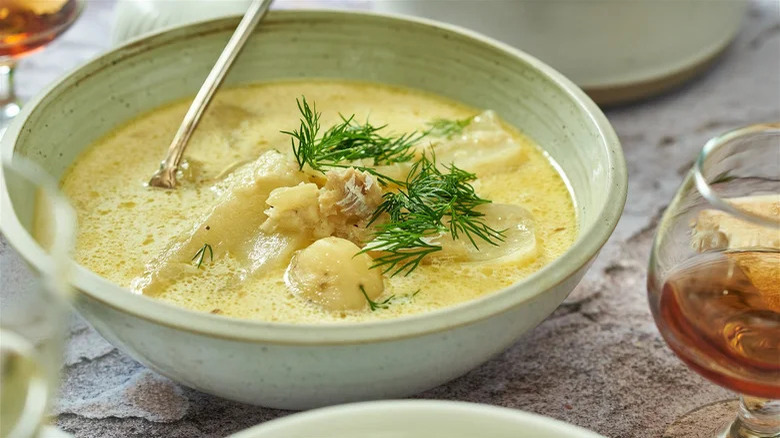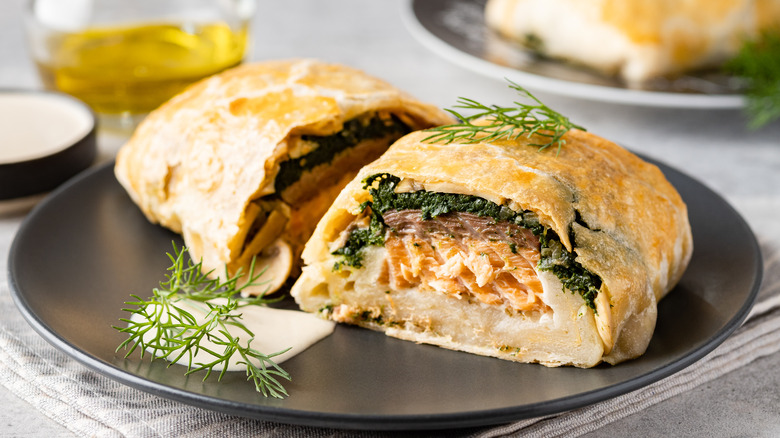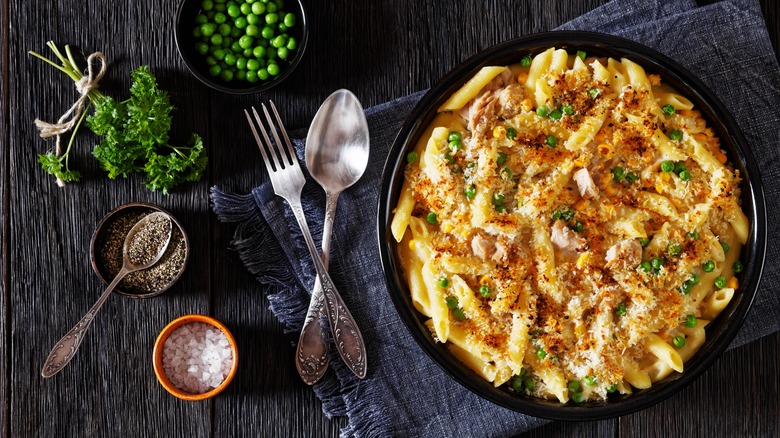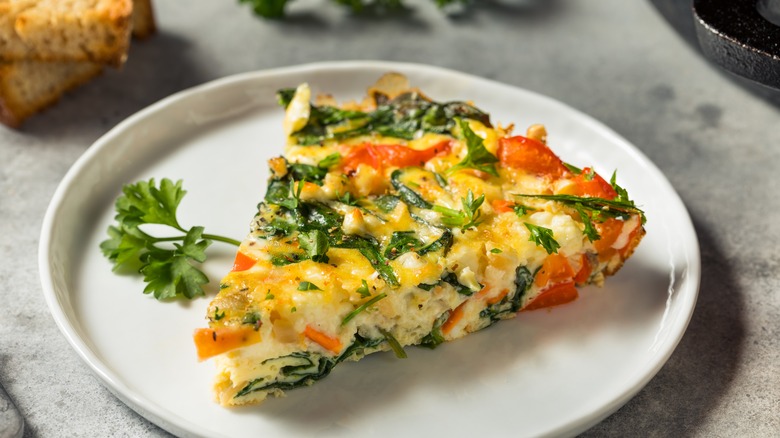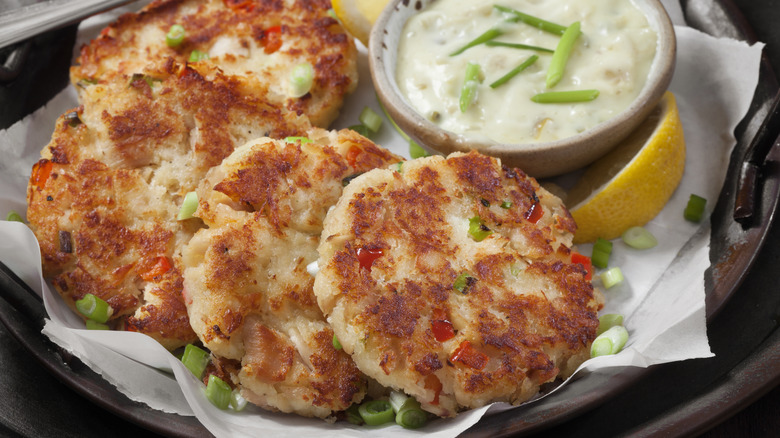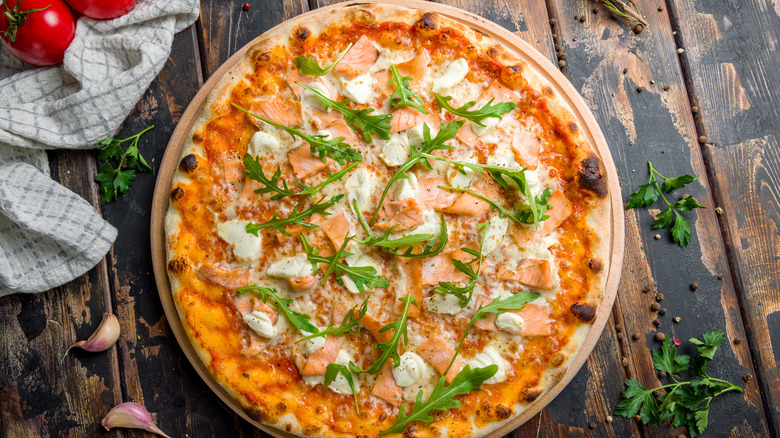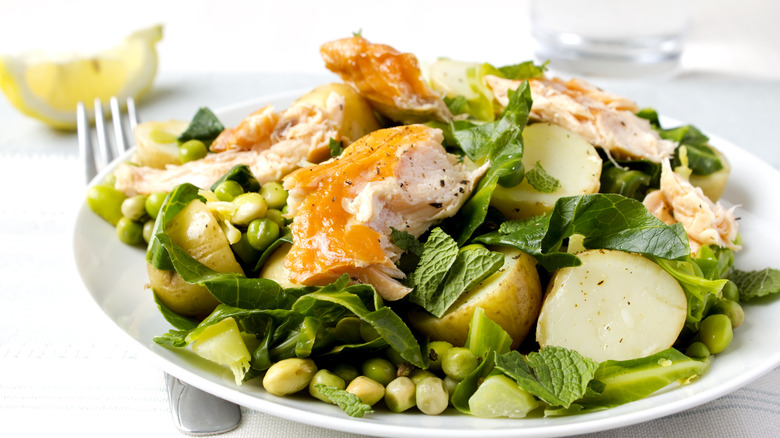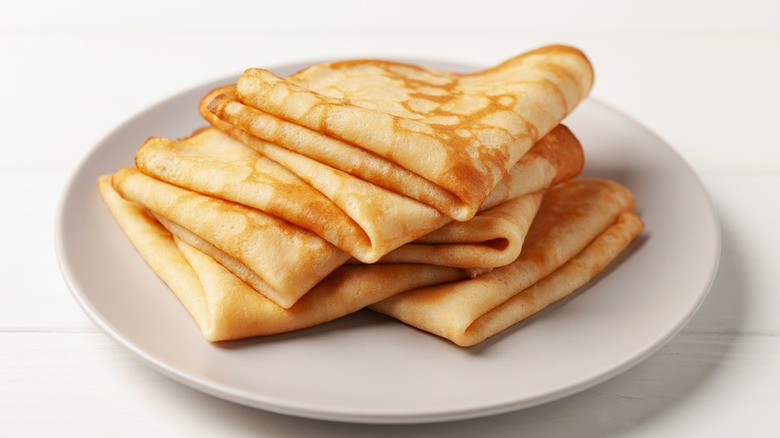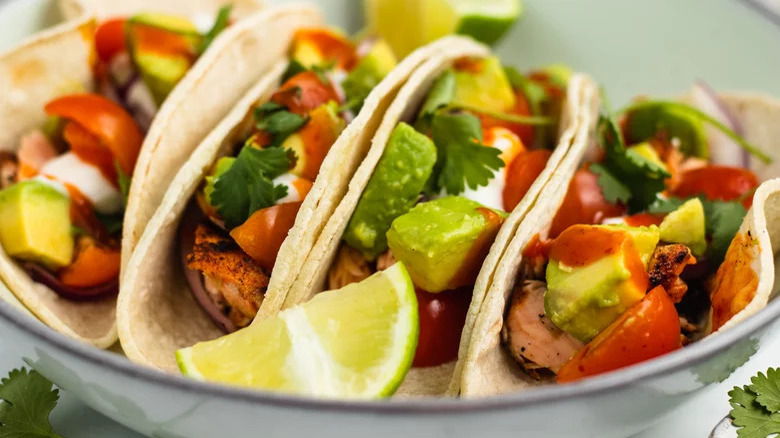14 Ways To Elevate Canned Salmon
Canned salmon, a versatile and convenient pantry staple, has emerged as a popular choice for discerning cooks who've had enough of the same old tuna or who want a healthier meal without the complications of cooking fish from scratch. Packed with omega-3 fatty acids, protein, and essential minerals, canned salmon acts as a perfect vessel to deliver components of a nutritious diet. Its extended shelf life makes this task even more convenient to accomplish.
Indeed, busy lifestyles often demand quick and easy meal solutions, and canned salmon provides just that. Whether you're a home cook looking to whip up a speedy weeknight dinner or an outdoor enthusiast seeking a lightweight, portable protein source for camping trips, canned salmon shows up in a big way. It also gives consumers the option of sustainability as long as they choose wild-caught varieties. To that end, we've put together a list of the best ways to elevate that can of salmon in your pantry based on our favorite recipes.
1. Form salmon croquettes or patties
In the realm of all things fish, the quest for exquisite flavors need not be thwarted by the constraints of a frugal wallet. Enter canned salmon, an unsung hero of the pantry. While the gastronomic ideal may whisper the name of fresh fish, the pragmatic reality is that we need canned fish to periodically rescue us from the shackles of a last-minute shopping sprint or from the perils of overspending.
But this is not the kind of ingredient that you should fry up in a pan and devour as is. Rather, we recommend you use it to make pan-fried salmon croquettes. In these little round pieces of joy, canned salmon becomes the muse, donning a cloak of panko breadcrumbs and carefully selected seasonings — just be sure to drain the salmon before using it. The croquettes, which are similar to these salmon patties, are tasty on their own, but pair them with a creamy dill and lemon dip for some extra pizzazz. For added convenience, use the empty can to mold your salmon mixture into perfectly-sized croquettes.
2. Make it into a salmon burger
Burgers are the ultimate American comfort food, but you don't have to be a meat-eater or in the mood for meat to partake in this cultural norm. A salmon burger can taste just as comforting, and it doesn't even have to take up all that much time — if you use canned salmon. The canned variety is cheaper and already cooked, which means that you get to skip the laborious step of preparing your salmon and baking it for 15 to 20 minutes.
Instead, jump right into your recipe by mixing your canned salmon with your favorite burger ingredients, such as mustard, mayo, dill, breadcrumbs, and eggs, to hold everything together. Once that's done, craft your patties to the desired size and then fry them up in your pan until the eggs are fully cooked and the patties are warmed through. Serve them on a burger bun along with fresh lettuce and tomato.
3. Speed up your salmon sushi bake
For this recipe to make sense, you have to remember that sushi is not just the raw fish served at Japanese restaurants. Sushi also encompasses the rice itself, which is specially prepared with vinegar. Now that we've clarified that, let's talk salmon sushi bake, which is an excellent recipe to use if you're seeking to elevate the canned salmon on your shelf.
The original recipe not only calls for fresh fish, but it also asks you to bake that fish for 15 minutes in the oven. With canned salmon, you can simply skip that step and move right along to the part where you make the rice, put it in a casserole dish, and top it with your salmon mixed with soy sauce and mayo. This cuts your prep time for the dish down to 30 minutes from 45, which is great news for weeknight warriors.
4. Swap tuna for salmon
Whether we remember or not, we all have a few tuna cans lying around in our pantry somewhere. Go ahead. Check your shelves, and you'll see we're right. It's equally likely that we've reached for those cans of tuna every so often over the years, looking for a pop of protein to add to an otherwise lifeless meal. Tuna salad — a spread-like mixture that has very little in common with actual salad — is a popular dish to make with canned tuna. You just need to mix some canned tuna with mayo and seasoning, slap some bread over it, and call it a meal.
But don't limit your pantry foraging to canned tuna. There is also canned salmon, which can change the flavors of your ingredients without fundamentally altering your habits or recipes. Simply swap that tuna for salmon, and you've got yourself a whole new sandwich. Pay attention to this canned salmon salad recipe because it will pull a switcheroo on you: Instead of calling for mayo, it asks you to mix your canned salmon with Greek yogurt along with chopped celery and onions, mustard, seasoning, and lemon juice. But other than that, the steps are basically the same as your typical tuna salad.
5. Stir it into pasta
We have tomato-based pasta sauces coming out of our ears, but for those nights when you're in the mood for something different, we also have this scrumptious creamy salmon pasta recipe, which can be made even quicker and easier by substituting fresh salmon with the canned variety. In addition, you'll need olive oil, garlic, diced onion, asparagus, lemon, heavy cream, dry white wine, Parmesan, and seasoning to taste.
Combine all these ingredients except for the salmon and cook them in the appropriate order. Finally, the salmon goes in last, along with your cooked pasta. Just be sure to roughly chop the canned fish into chunks first so it breaks apart into evenly sized pieces. Then, continue to cook it until everything is warmed through. The secret is to ensure the salmon and asparagus chunks are more or less the same size, providing an even texture throughout.
6. Use salmon for your fish chowder
There are many ways to use fish in soups. Italian cioppino comes to mind, while a New England clam chowder can really hit the spot on a cold evening. Using canned salmon in either of these recipes would be just fine, but there is one particular dish we'd like to turn you onto, and that's this Nordic fish chowder, which typically uses whitefish.
This dish is a great introduction to Nordic cuisine for the uninitiated, while also providing an ideal blend of familiar flavors for those who are well acquainted with northern culinary sensibilities. It also provides a perfect balance between creaminess — from the heavy cream and potato starch — and lightness, provided by the dill and Pernod. This is what makes it deviate from American-style chowders, which are often thickened with flour and end up with a gravy-like consistency. Despite this intricate blend of flavors and textures, the chowder only takes about 35 minutes to cook.
7. Try your hand at a salmon coulibiac
One thing you might not have known about Prince Philip, husband to the late Queen Elizabeth II, was that he was something of a foodie. Stories abound of him cooking for himself and others like a commoner would, using ingredients and kitchen tools with his bare hands instead of solely letting his white-gloved staff serve him. But one dish he favored, according to a former royal chef, was salmon coulibiac, originating from Russia and involves salmon and other ingredients cooked in puffed pastry.
More specifically, the dish features rice, mushrooms, spinach, salmon, shallots, dill, and white wine, all mixed into a balanced marriage of flavors. As good as that sounds, this dish is not easy to find on modern menus. Your best bet to sample one then is to find a recipe, gather your canned salmon, and make it yourself at home.
8. Transform a tuna casserole into a salmon casserole
A casserole, by its very essence, should be a trifecta of attributes: cheap, easy, and delicious. Tuna casserole emerges as a beacon of convenience and flavor due to its reliance on budget-friendly non-perishables. But if you don't mind a bit of daring and aren't afraid to stray from established norms, we suggest you switch up that tuna with some canned salmon for your next casserole.
For this new culinary adventure, we have the perfect recipe -– just remember to lose the tuna and use salmon at the opportune moment. In addition to this tweak, you will also find that the recipe calls for Dijon mustard and fresh dill, ingredients that are typically extraneous to tuna casserole but work especially well with the salmon version. As a bonus, this recipe calls for dry noodles, which means you don't have to set aside additional time to boil them before baking.
9. Empty it into your frittata
Knowing how to make a good and proper frittata can be life-changing. Once you know the basics of it, you can use pretty much anything you want as a filling, allowing you to turn a single dish into many delicious meals. One such meal would be a canned salmon frittata, complemented with dill or any other herbs or seasonings of your choice.
And to make that frittata extra special, get your broiler ready. While a stovetop frittata will do just fine, just fine is not enough to reach the rarified ranks of culinary splendor. For that, you will need to preheat your broiler so that when your frittata looks ready to be served, you stick it in the oven for a few minutes. The result — canned salmon or not — will be a golden-brown crispy topping sure to impress your guests. Meanwhile, the center of the frittata will remain moist and fluffy. It's the best of both worlds. Remember that the eggs must be allowed to reach that ethereal state — just set and a tad jiggly — before they go under the broiler.
10. Cook up the ideal salmon cakes
Fish cakes can be a bit bland, especially if you're grabbing them from a tepid heating station at a buffet in a somber conference hotel. But salmon cakes, with the right accompanying ingredients, are quite another matter, especially when you're following our very own rye-and-salmon cakes recipe.
For this one, you'll need to prepare two main components: salmon cakes and dill sauce. The first one can rise above conference room mediocrity with the inclusion of rye bread instead of plain breadcrumbs. Rye is far more flavorful and comes with a heartier texture. The cannellini beans, which are also not a common fish cake ingredient, will play a prominent role, especially in creating a firmer texture. Lastly, the dill pickles and grainy Dijon mustard will infuse the cakes with a brinier flavor, which is just what you need to cut through the soft and creamy fish taste.
11. Top off your pizza with it
Figuratively speaking, nothing can top a plain margherita pizza made with high-quality red sauce and fresh mozzarella. But once in a while, it's nice to add some pepperoni or grilled vegetables or have some fun with other wild and crazy ingredients.
A new and wild ingredient you could try on your pizza is canned salmon. You may have heard of adding smoked salmon to pizza, as pioneered by Wolfgang Puck for the Spago restaurant in Beverly Hills. But there's no rule against adding canned salmon. Scatter it over the top of the pizza before it goes in the oven to let it sink into the cheese and take up residence there. The flavor combination works, and if you use a wood-burning oven to cook your pizza, you might end up with a slightly smoky salmon!
12. Toss salmon into a salad
When it comes to food, sometimes the simplest option is the best option. This is true in terms of tossing canned salmon into a salad. At its most basic, this dish just involves getting some leafy greens together, adding the salmon along with some other choice ingredients, like palm hearts or sliced radishes, and mixing it all together with a light vinaigrette.
However, for something with a bit more pizzazz, try canned salmon with our salmon and squash salad with roasted pear dressing recipe. Although glazing canned salmon will not have the same effect as doing so on fresh salmon and then baking to allow the flavors to combine, canned salmon can save you time on the recipe without foregoing the protein element of the salad. You can make up for it in other ways: Toss the butternut squash in the glaze before putting it in the oven or add some extra flavor to the salad with pomegranate seeds or dried cranberries. This recipe is flexible and can accommodate a wide range of variations.
13. Bake it into a crepe
A smoked salmon and cream cheese combination is a popular filling for crepes, bagels, and more. But non-smoked salmon can be just as good, especially when paired with the right ingredients. This salmon and spinach-filled crepe recipe perfectly illustrates this point, even though it deviates slightly from a typical French crepe, as it is baked rather than prepared on a stovetop.
This recipe also requires quite a few steps and moving parts. Once you've prepared each element — the crepes themselves, the sauce, the spinach mixture, and the salmon — you'll have to assemble them in an ovenproof dish, starting by laying down the crepes and placing the salmon on top. While this recipe calls for a whole salmon filet, no one will fault you if you don't happen to have one on hand. Just add your canned salmon, then top that with the rest of the components.
14. Include salmon in your tacos
Tacos are one of those magical foods that can accommodate all sorts of variations and additions, including in their very composition — you can make a taco with a soft corn tortilla, a hard shell, flour, and more. Another thing you can do is add all manner of fresh fish and even canned salmon, as illustrated by our fried salmon tacos recipe.
The only real cooking component of the recipe is when you fry the salmon, so this dish becomes a real breeze when you remove that step and use canned salmon. The bulk of the work is now just chopping and dicing the fruits and vegetables. Toss the mixture of olive oil, garlic, cumin, chili powder, onion powder, and salt that was supposed to go on the fried salmon with the rest of the ingredients, mixing them with this dressing before putting it in your taco shell. Afterward, you'll just need to place the salmon in your chosen taco shells along with the avocado, cherry tomatoes, red onion, cilantro, and lime juice. Serve with sour cream and hot sauce.
Static Media owns and operates Tasting Table, Mashed, and Food Republic.
